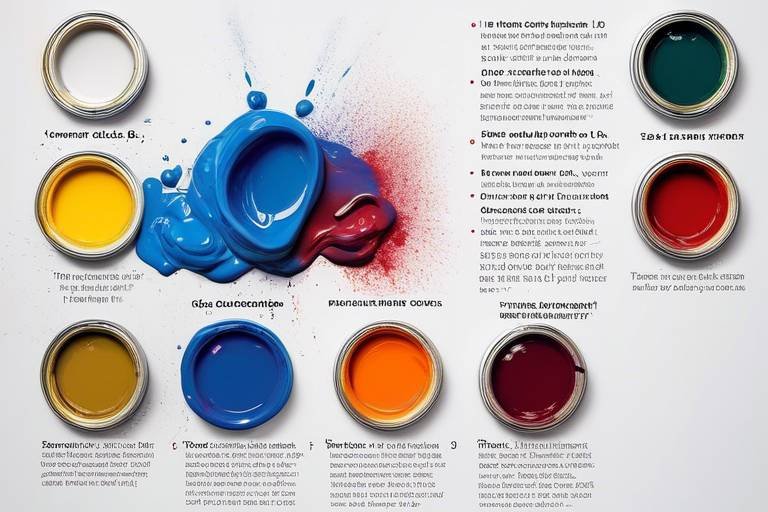The Science of Energy Drinks - What’s Inside?
Energy drinks have become a staple in modern society, particularly among young adults and athletes seeking an extra boost. But what exactly is in these vibrant cans that promise to revitalize our bodies and minds? Understanding the ingredients and their effects is crucial for making informed choices. In this article, we will delve into the science behind energy drinks, examining their key components and the implications of their consumption.
Caffeine is the rockstar ingredient in energy drinks, known for its ability to increase alertness and reduce fatigue. Typically derived from sources like coffee beans, tea leaves, and even synthetic processes, caffeine's popularity is no accident. Most energy drinks contain varying amounts of caffeine, often ranging from 80 mg to over 300 mg per serving. To put that in perspective, a standard cup of coffee has about 95 mg of caffeine. The impact of caffeine on the body is profound; it stimulates the central nervous system, leading to heightened focus and energy. However, the effects can vary widely based on individual tolerance levels. Some may thrive on a single can, while others might feel jittery or anxious after just a sip. It's essential to know your limits!
Aside from caffeine, energy drinks often boast a cocktail of additional ingredients designed to enhance their energizing effects. Let's break down some of the most common components:
- Taurine: An amino acid that is believed to support neurological function and may enhance athletic performance.
- B Vitamins: These are included for their role in energy metabolism, helping to convert food into usable energy.
- Sugar: A quick source of energy, though it can lead to crashes and health issues when consumed in excess.
While these ingredients can provide certain benefits, they also come with risks. For instance, excessive sugar intake can lead to weight gain and other metabolic issues, while taurine’s long-term effects are still being studied.
Taurine is often marketed as a performance enhancer and is frequently found in energy drinks. Some studies suggest that it may improve exercise performance and recovery. However, the safety of high doses of taurine is still under scrutiny. While moderate consumption is generally regarded as safe, excessive intake could lead to unknown health risks, making it essential to consume energy drinks with caution.
B vitamins play a crucial role in energy metabolism, but do they really enhance energy levels when included in energy drinks? The answer isn't straightforward. While these vitamins are vital for converting food into energy, most people get sufficient amounts from their diet. Therefore, the additional B vitamins in energy drinks may not significantly boost energy levels unless someone is deficient. So, if you're relying on energy drinks for a B vitamin boost, you might want to reconsider your approach.
The sugar content in energy drinks can be staggering. A single can may contain upwards of 30 grams of sugar, which is equivalent to several teaspoons! This sugar provides a quick energy spike but can lead to a significant crash later on. Many brands are now opting for sugar alternatives like sucralose or aspartame to cater to health-conscious consumers. While these alternatives may reduce calorie intake, they can also come with their own set of health concerns. It’s a classic case of weighing the pros and cons!
While energy drinks can provide a quick energy boost, they are not without their health risks. Studies have linked excessive consumption to various health issues, including:
- Heart Problems: Increased heart rate and blood pressure can occur, especially in individuals with pre-existing conditions.
- Anxiety: High caffeine levels can exacerbate anxiety and lead to panic attacks.
- Sleep Disturbances: Consuming energy drinks late in the day can disrupt sleep patterns, leading to fatigue.
Moderation is key! It's crucial to be mindful of how many energy drinks you consume, as the cumulative effects can be detrimental to your health.
Many athletes turn to energy drinks for a competitive edge. But do these beverages genuinely enhance performance? The evidence is mixed. While some studies suggest that energy drinks can improve short-term performance in endurance sports, the long-term effects on health and dependency are concerning.
Research indicates that energy drinks can provide a temporary boost in physical performance. Athletes often report increased stamina and improved focus during workouts. However, these benefits can come at a cost, as the body may rely on these drinks for energy instead of natural sources.
While energy drinks can be beneficial in the short term, athletes must consider their long-term health. Relying on these beverages can lead to nutritional imbalances and potential dependency. A balanced diet rich in whole foods is essential for sustained energy and performance.
The energy drink market is subject to various regulations aimed at ensuring consumer safety. Health organizations recommend labeling requirements that inform consumers about caffeine content and other ingredients. Awareness and education are crucial in promoting safe consumption practices, especially among young people.
Q: Are energy drinks safe for everyone?
A: While many people can consume energy drinks without issue, they may not be suitable for individuals with certain health conditions, such as heart problems or anxiety disorders.
Q: Can I rely on energy drinks for daily energy?
A: It's best to use energy drinks sparingly. A balanced diet and adequate sleep are more effective for sustaining energy levels.
Q: What’s the difference between energy drinks and sports drinks?
A: Energy drinks are designed to boost energy and alertness, while sports drinks are formulated to replenish electrolytes and hydration during physical activity.

[Understanding Caffeine Content]
Caffeine is the rock star of energy drinks, and for good reason! It's the primary ingredient that gives you that much-needed boost when you're feeling sluggish. But what exactly is caffeine, and how does it affect our bodies? Caffeine is a natural stimulant found in various plants, such as coffee beans, tea leaves, and cacao pods. When consumed, it works by blocking the effects of adenosine, a neurotransmitter that promotes sleep, thereby increasing alertness and reducing fatigue. This is why many people reach for an energy drink when they need to power through a long day or an intense workout.
When it comes to energy drinks, the caffeine content can vary significantly from one brand to another. Typically, a standard energy drink contains anywhere from 80 mg to over 300 mg of caffeine per serving. To put this into perspective, a regular cup of coffee usually contains about 95 mg of caffeine. Here’s a quick comparison of caffeine content across different popular energy drinks:
| Brand | Caffeine Content (mg/serving) |
|---|---|
| Red Bull | 80 |
| Monster Energy | 160 |
| Rockstar Energy | 160 |
| 5-hour Energy | 200 |
| Bang Energy | 300 |
As you can see, some energy drinks pack a serious punch when it comes to caffeine! But why do people love these drinks so much? The answer lies in the immediate effects of caffeine. It can enhance your mood, improve cognitive function, and even boost physical performance. However, it’s essential to remember that too much caffeine can lead to side effects such as increased heart rate, anxiety, and sleep disturbances. This leads us to an important question: how much caffeine is too much?
Health experts generally recommend a maximum intake of 400 mg of caffeine per day for most adults. This amount is typically safe for most people, but individual tolerance can vary greatly. Factors such as age, weight, and overall health can play a significant role in how your body reacts to caffeine. Therefore, it’s crucial to listen to your body and adjust your intake accordingly.
In conclusion, understanding the caffeine content in energy drinks is vital for making informed choices. While these drinks can provide a quick energy boost, moderation is key to avoiding unwanted side effects. So, the next time you're reaching for that can of energy, take a moment to consider how much caffeine you're consuming and how it fits into your overall daily intake.

[Other Common Ingredients]
When you crack open a can of your favorite energy drink, what else are you gulping down besides caffeine? While caffeine is the star of the show, there are a host of other ingredients that play supporting roles in the quest for that quick energy boost. Understanding these components can help you make informed choices about your consumption. Let's dive into some of the most common ingredients you'll find in energy drinks, including taurine, B vitamins, and sugar, and examine their effects on your body.
Taurine is an amino acid that is often touted for its potential benefits, such as improving physical performance and mental clarity. It's naturally found in meat and fish, but energy drinks have turned it into a common additive. While some studies suggest that taurine can enhance athletic performance and reduce muscle damage, there are also concerns about its safety when consumed in large quantities. So, is it a miracle worker or just another ingredient? The jury is still out.
Next up are the B vitamins, which are frequently included in energy drinks for their role in energy metabolism. Vitamins like B3 (niacin), B6, and B12 are essential for converting food into energy. However, many of us get enough B vitamins from our diets, so the added boost from energy drinks may not be as significant as advertised. In fact, excessive intake of these vitamins can lead to side effects like nausea and headaches. It's like adding a turbocharger to a car that already has a powerful engine—sometimes, it’s just unnecessary.
Now, let’s talk about sugar. Energy drinks often have high sugar content, which can lead to a quick spike in energy levels. However, this sugar rush is usually followed by a crash, leaving you feeling more tired than before. Many brands are now turning to sugar alternatives to combat this issue, offering lower-calorie options. But are these alternatives any better for you? Some studies suggest that while they may reduce calorie intake, they can also lead to cravings and other metabolic issues. Here’s a quick comparison:
| Ingredient | Calories (per serving) | Health Implications |
|---|---|---|
| Sugar | 30-50 | Quick energy boost, potential crash |
| Sucralose (artificial) | 0 | Lower calorie, may affect gut health |
| Stevia (natural) | 0 | Natural, less impact on blood sugar |
In summary, while taurine, B vitamins, and various sugars or sugar alternatives contribute to the overall effects of energy drinks, their benefits and risks can vary widely. It's essential to be mindful of what you're consuming. Are you really getting the energy boost you need, or are you just loading up on ingredients that could lead to unwanted side effects? The next time you reach for that can, think about what's inside and how it might affect your body.
Q: Are energy drinks safe for everyone?
A: While many people can consume energy drinks safely, they may not be suitable for children, pregnant women, or individuals with certain health conditions. Always consult a healthcare professional if you're unsure.
Q: Can I mix energy drinks with alcohol?
A: Mixing energy drinks with alcohol can mask the effects of intoxication, leading to increased risk of overconsumption. It’s generally advised to avoid this combination.
Q: How often should I consume energy drinks?
A: Moderation is key. It's best to limit your intake to a few times a week, especially considering the potential health risks associated with excessive consumption.

[Taurine: Benefits and Risks]
Taurine is a naturally occurring amino acid that has gained significant attention in the realm of energy drinks. Often touted as a key ingredient, it’s essential to understand what taurine is, where it comes from, and how it affects our bodies. Found in high concentrations in the brain, heart, and muscles, taurine plays a variety of roles, from supporting cardiovascular health to aiding in muscle function. But what exactly does it do when mixed with caffeine and other stimulants in energy drinks?
One of the primary benefits of taurine is its potential to enhance athletic performance. Research suggests that taurine can improve exercise capacity, reduce muscle fatigue, and even promote recovery after intense workouts. This is particularly appealing to athletes looking for that extra edge. However, the science is still evolving, and while some studies indicate positive effects, others remain inconclusive. So, does taurine really deliver on its promises, or is it just another marketing gimmick?
Moreover, taurine is known for its role in regulating hydration and electrolyte balance, which is crucial during physical activity. It acts as an antioxidant, protecting cells from damage caused by oxidative stress. This is especially important for athletes who push their bodies to the limit. But here's the catch: while taurine can be beneficial, excessive consumption through energy drinks raises some red flags.
Let's talk about the risks. Although taurine is generally considered safe in moderate amounts, the combination of high doses found in some energy drinks can lead to adverse effects. Potential risks include:
- Heart Issues: High taurine levels may affect heart function, especially when combined with other stimulants like caffeine.
- Anxiety: Some users report increased feelings of anxiety or nervousness, which could be exacerbated by the stimulating effects of caffeine.
- Sleep Disturbances: The stimulating nature of energy drinks can interfere with sleep patterns, leading to insomnia or poor sleep quality.
In summary, taurine can offer several benefits, particularly for those engaged in high-intensity activities. However, moderation is key. It’s crucial to be aware of how much taurine you’re consuming, especially when combined with other stimulants. As with many ingredients in energy drinks, the effects can vary widely from person to person, making it essential to listen to your body and consult with a healthcare professional if you have concerns.
As energy drinks continue to rise in popularity, understanding the role of taurine is vital. It's not just about the instant energy boost; it's about the long-term implications for your health and well-being. So, the next time you reach for that can of energy, remember to consider what’s inside and how it might affect you.
Q: Is taurine safe for everyone?
A: While taurine is generally safe for most people, those with certain medical conditions or sensitivities should consult a healthcare professional before consuming energy drinks containing taurine.
Q: Can taurine improve my workout performance?
A: Some studies suggest that taurine may enhance exercise performance and reduce fatigue, but results can vary among individuals.
Q: How much taurine is too much?
A: While there is no established upper limit for taurine intake, moderation is key. Excessive consumption through energy drinks can lead to potential health risks.

[B Vitamins: Are They Effective?]
B vitamins are often touted as essential components in energy drinks, but do they really provide the boost that many consumers expect? These vitamins, which include B1 (thiamine), B2 (riboflavin), B3 (niacin), B5 (pantothenic acid), B6 (pyridoxine), B7 (biotin), B9 (folate), and B12 (cobalamin), play crucial roles in energy metabolism. They help convert the food we eat into energy, which sounds fantastic on paper. However, the effectiveness of these vitamins when consumed through energy drinks is a topic of debate.
First and foremost, it's essential to understand that B vitamins are water-soluble, meaning they don't stay in the body for long periods. When you consume energy drinks loaded with these vitamins, any excess that your body doesn't need will simply be excreted. This raises the question: Are we really getting any benefit from the B vitamins in energy drinks, or are we just flushing money down the toilet?
Research indicates that while B vitamins are crucial for maintaining energy levels, the average person who consumes a balanced diet likely gets enough of these vitamins from their food. Foods rich in B vitamins include whole grains, meats, eggs, dairy products, legumes, seeds, and leafy greens. Therefore, for most people, the additional B vitamins in energy drinks might not provide any significant advantage. However, for individuals with deficiencies or those with specific dietary restrictions, these vitamins could be beneficial.
Moreover, let's consider the context in which energy drinks are consumed. Often, these beverages are used during times of fatigue or when individuals are seeking a quick energy boost. While B vitamins can support energy metabolism, the immediate effects of energy drinks are more likely attributed to caffeine and sugar rather than the B vitamins themselves. So, if you're relying on energy drinks for a quick pick-me-up, you might be better off focusing on the caffeine content rather than the B vitamins.
In summary, while B vitamins are undoubtedly important for energy production, their effectiveness when consumed in energy drinks is questionable for the average consumer. It's essential to weigh the benefits against the potential downsides of excessive energy drink consumption, which can include increased heart rate and anxiety. If you're looking for sustained energy, focusing on a balanced diet rich in natural sources of B vitamins may be the better strategy.
As a final note, if you're considering energy drinks for their B vitamin content, it might be wise to consult with a healthcare professional or a nutritionist. They can provide personalized advice based on your dietary needs and health goals.
- What are the main benefits of B vitamins? B vitamins help convert food into energy and play a role in maintaining healthy skin, muscle tone, and brain function.
- Can I get enough B vitamins from my diet? Yes, most people who eat a balanced diet rich in whole foods typically get enough B vitamins.
- Are energy drinks a good source of B vitamins? While they contain B vitamins, they should not be relied upon as the primary source due to other unhealthy ingredients like high sugar and caffeine levels.
- What should I do if I think I have a B vitamin deficiency? Consult with a healthcare provider for testing and advice on supplementation or dietary changes.

[Sugar vs. Sugar Alternatives]
When it comes to energy drinks, sugar content is a hot topic. Many of us are drawn to the sweet taste of these beverages, but have you ever stopped to consider what that sugar is doing to your body? Regular sugar, also known as sucrose, is often used in energy drinks to provide a quick source of energy. However, consuming high amounts of sugar can lead to a rollercoaster of energy spikes followed by crashes, not to mention the long-term health risks associated with excessive sugar intake, such as obesity, diabetes, and heart disease.
On the flip side, many energy drink brands are now opting for sugar alternatives to cater to health-conscious consumers. These alternatives, such as aspartame, sucralose, and stevia, promise the sweetness without the calories. But do they really deliver? While they can help reduce calorie intake, the long-term effects of consuming artificial sweeteners are still a matter of debate. Some studies suggest that they may disrupt gut health or even lead to cravings for more sugary foods, creating a paradox for those trying to cut back on sugar.
Here’s a quick comparison of traditional sugars and sugar alternatives:
| Ingredient | Calories (per serving) | Health Implications |
|---|---|---|
| Sugar (Sucrose) | 16 calories per teaspoon | Can lead to energy crashes, weight gain, and increased risk of chronic diseases. |
| Aspertame | 0 calories | Generally recognized as safe, but concerns about potential metabolic effects. |
| Sucralose | 0 calories | Safe for most people, but can affect gut bacteria in some studies. |
| Stevia | 0 calories | Natural sweetener with potential health benefits, but some may experience digestive issues. |
In summary, while sugar can provide that instant energy boost, it often comes with a price. On the other hand, sugar alternatives can help you avoid those dreaded sugar crashes, but they are not without their own set of concerns. As with most things in life, moderation is key. It’s essential to pay attention to how your body reacts to both sugars and sugar alternatives, and to make informed choices that align with your health goals.
- Are energy drinks safe to consume regularly? It’s best to consume them in moderation, as excessive intake can lead to health issues.
- Can sugar alternatives cause weight gain? Some studies suggest that artificial sweeteners may lead to increased cravings for sugary foods, potentially contributing to weight gain.
- What’s the best choice for energy? Whole foods and balanced meals are generally the best for sustained energy levels without the crash.

[The Impact on Health]
When it comes to energy drinks, the buzz often overshadows the potential health risks associated with their consumption. While these beverages can provide a quick boost of energy, they can also lead to a range of health issues that are often overlooked. It's essential to dive deeper into how these drinks can affect your body and mind, especially when consumed in excess.
One of the most pressing concerns is the impact of high caffeine levels. Energy drinks can contain anywhere from 80 mg to over 500 mg of caffeine per serving, depending on the brand. To put this in perspective, a standard cup of coffee contains about 95 mg of caffeine. Regularly consuming high doses of caffeine can lead to increased heart rate, elevated blood pressure, and in some cases, even heart palpitations. For individuals with pre-existing heart conditions, this can be particularly dangerous.
Moreover, the combination of caffeine with other ingredients, such as sugar and taurine, can exacerbate these effects. High sugar content is another significant factor to consider. Many energy drinks contain more than 30 grams of sugar in a single serving, which is equivalent to about 7.5 teaspoons. This excessive sugar intake can lead to weight gain, increased risk of diabetes, and even dental problems. It's a classic case of instant gratification leading to long-term health consequences.
Additionally, the stimulating effects of energy drinks can result in heightened anxiety levels and disrupt normal sleep patterns. Many consumers report experiencing insomnia or restlessness after consuming these beverages, which can lead to a vicious cycle of fatigue and reliance on energy drinks. It's like trying to stay awake by pouring more fuel into a fire; eventually, it just burns out.
Here’s a quick overview of some health risks associated with energy drink consumption:
- Heart Issues: Increased heart rate and blood pressure.
- Anxiety: Heightened feelings of anxiety and nervousness.
- Sleep Disturbances: Difficulty falling and staying asleep.
- Dependency: Potential for developing a reliance on energy drinks for energy.
In summary, while energy drinks can provide a quick energy boost, they come with a host of potential health risks that should not be ignored. It's crucial for consumers to be aware of their limits and consider healthier alternatives for staying energized. Moderation is key, and understanding the ingredients and their effects can empower individuals to make informed choices about their energy drink consumption.
Q: Are energy drinks safe to consume daily?
A: While occasional consumption may be fine for most people, daily intake can lead to health risks such as increased heart rate, anxiety, and sleep disturbances. It’s best to consult with a healthcare provider for personalized advice.
Q: Can energy drinks improve athletic performance?
A: Energy drinks may provide a short-term boost in endurance and strength, but their long-term effects on health and performance are still debated. Balanced nutrition is crucial for sustained athletic performance.
Q: What are the alternatives to energy drinks?
A: Natural alternatives such as water, herbal teas, or smoothies made with fruits and vegetables can provide energy without the risks associated with energy drinks.

[Energy Drinks and Athletic Performance]
When it comes to athletic performance, energy drinks have carved out a significant niche in the sports world. Many athletes swear by these beverages, claiming they provide the extra edge needed to push through tough workouts or competitions. But is there any scientific backing to these claims? Let's dive into the evidence and explore how energy drinks may impact physical performance.
First off, it's essential to understand that energy drinks typically contain a combination of caffeine, sugars, and other ingredients designed to enhance energy levels. Caffeine, in particular, is known for its ability to improve endurance and focus. Studies have shown that caffeine can enhance performance in various sports, from running to cycling. For instance, a meta-analysis published in the Journal of Sports Medicine revealed that caffeine consumption before endurance activities could lead to improved performance by approximately 3-4%. This might not sound like much, but in competitive sports, even a few seconds can mean the difference between victory and defeat.
Moreover, energy drinks often provide a quick source of carbohydrates, which are crucial for athletes. During intense physical activity, our bodies rely on stored glycogen for energy. Consuming these drinks can replenish glycogen stores faster than water alone, potentially leading to improved recovery times. However, athletes should be cautious about the sugar content in these drinks. While sugar can provide a quick energy boost, excessive sugar intake can lead to energy crashes and other health issues.
Now, let’s talk about the short-term effects of energy drinks on athletic performance. Many athletes report feeling an immediate surge of energy and increased alertness after consuming these beverages. This can be particularly beneficial during high-intensity workouts or competitions. However, the effects can vary significantly between individuals. Some may experience jitters or anxiety, while others might feel invigorated. It's a bit like riding a roller coaster—thrilling for some, but potentially nauseating for others.
It’s also essential to consider the long-term implications of regular energy drink consumption for athletes. While the occasional use may enhance performance, relying on these drinks can lead to dependency. Athletes might find themselves needing to consume them just to feel "normal" during workouts. This dependency can create a vicious cycle, where the need for energy drinks overshadows the importance of proper nutrition and hydration.
In addition to the physical effects, there are psychological aspects to consider. The belief that energy drinks will enhance performance can create a mental crutch for some athletes. This can lead to overconsumption, especially if they perceive that their competitors are using these drinks as well. It's crucial for athletes to recognize that while energy drinks can be beneficial, they should not replace a well-rounded diet and adequate hydration.
In conclusion, energy drinks can offer a temporary boost in performance for athletes, particularly in endurance sports. However, moderation is key. Athletes should be aware of their bodies' responses to these beverages and consider their long-term health and performance goals. Instead of relying solely on energy drinks, a balanced approach that includes proper nutrition, hydration, and rest will yield the best results in the long run.
- Can energy drinks improve athletic performance? Yes, they can provide a temporary boost in energy and endurance, primarily due to their caffeine content.
- Are there any risks associated with energy drink consumption? Yes, excessive consumption can lead to health issues such as increased heart rate, anxiety, and sleep disturbances.
- How should athletes consume energy drinks? Moderation is crucial. They should be used strategically, ideally before intense workouts or competitions, and should not replace proper nutrition.

[Short-Term Effects on Performance]
When it comes to enhancing athletic performance, many athletes turn to energy drinks as a quick fix. But what exactly do these drinks do in the short term? The primary effects are often seen in terms of increased energy and improved focus. This is largely due to their high caffeine content, which can lead to a surge in adrenaline. Imagine your body as a car; caffeine acts like a turbocharger, giving you that extra boost when you need it most. Studies have shown that consuming energy drinks can enhance endurance and strength, making them a popular choice before competitions or intense training sessions.
Research suggests that energy drinks can improve reaction time and cognitive function, which are crucial during high-stakes sports. For instance, one study found that athletes who consumed energy drinks showed a notable improvement in their sprinting times compared to those who did not. This effect can be attributed to the combined action of caffeine and other ingredients like taurine, which may help in reducing fatigue.
However, it’s essential to consider the dosage and timing of consumption. Too much caffeine can lead to jitters, increased heart rate, and even anxiety, which can counteract the benefits. For optimal performance, many athletes find that consuming energy drinks about 30-60 minutes before an event can provide the best results. It’s like preparing for a big game; you wouldn’t want to wait until the last minute to warm up, right?
Interestingly, the effects of energy drinks can vary significantly from person to person. Factors such as body weight, tolerance to caffeine, and overall health can influence how one reacts to these beverages. For example, a lighter athlete may feel the effects of a single can much more intensely than a heavier athlete. This variability calls for a personalized approach to energy drink consumption, much like how different athletes have unique training regimens.
To provide a clearer picture, here’s a quick comparison of some popular energy drinks and their caffeine content:
| Energy Drink | Caffeine Content (mg) |
|---|---|
| Red Bull | 80 |
| Monster Energy | 160 |
| 5-hour Energy | 200 |
| Rockstar | 160 |
In summary, while energy drinks can provide a temporary boost in physical and mental performance, moderation is key. They can be a valuable tool for athletes looking to enhance their performance in the short term, but they should be used wisely. Just like any other performance-enhancing method, it’s crucial to understand your body’s needs and limitations. After all, the goal is to perform at your best without compromising your health.
- Can energy drinks improve athletic performance? Yes, they can provide a temporary boost in energy and focus, particularly due to their caffeine content.
- Are there any risks associated with energy drinks? Yes, excessive consumption can lead to side effects like anxiety, increased heart rate, and sleep disturbances.
- How much caffeine is safe for athletes? Generally, up to 400 mg per day is considered safe for most adults, but individual tolerance may vary.
- Should I consume energy drinks before a workout? Many athletes find it beneficial to consume them about 30-60 minutes before exercising for optimal performance.

[Long-Term Considerations for Athletes]
When it comes to energy drinks, athletes often find themselves in a bit of a quandary. On one hand, these beverages promise a quick boost in performance, but on the other hand, their long-term implications can be quite concerning. The key question is: are these drinks truly beneficial for sustained athletic performance, or do they come with hidden costs?
One of the primary concerns is the potential for dependency. Relying on energy drinks can create a cycle where athletes feel they need them to perform at their peak. This can lead to increased consumption, which may not only affect their health but also their natural energy levels. Over time, the body might become accustomed to these stimulants, making it harder to perform without them. Think of it like a crutch; while it may help you walk temporarily, you might end up leaning on it more than you should.
Moreover, the consumption of energy drinks can mask underlying fatigue. Athletes might push their bodies harder than they should, thinking they have the energy to keep going. This can lead to overtraining, which is detrimental in the long run. Overtraining can result in injuries, chronic fatigue, and even burnout. It’s essential for athletes to listen to their bodies and recognize when they need rest, rather than relying on a quick fix from a can.
In addition, the high sugar and caffeine content in many energy drinks can have negative effects on an athlete's overall health. For instance, excessive sugar intake can lead to weight gain and increased risk of metabolic disorders. Caffeine, while beneficial in moderation, can cause dehydration, especially if consumed in large quantities during intense workouts. A balanced diet rich in whole foods, lean proteins, and healthy fats is crucial for sustained energy and recovery.
To put things into perspective, consider this table that outlines the potential risks associated with long-term energy drink consumption for athletes:
| Potential Risks | Description |
|---|---|
| Dependency | Increased reliance on energy drinks for performance, leading to possible addiction. |
| Overtraining | Masking fatigue can lead to pushing beyond safe limits, resulting in injuries. |
| Weight Gain | High sugar content can contribute to increased body weight and metabolic issues. |
| Dehydration | Caffeine can lead to increased urination, risking dehydration during workouts. |
Ultimately, while energy drinks can provide a short-term boost, it’s essential for athletes to consider their long-term health. Engaging in a holistic approach to nutrition and performance, which includes adequate hydration, balanced meals, and sufficient rest, is far more beneficial than relying on these sugary, caffeinated beverages. Remember, the goal is not just to perform well today but to sustain your athletic career for years to come.
Q1: Are energy drinks safe for athletes?
A1: While energy drinks can provide a quick boost, their long-term safety is questionable. Athletes should use them sparingly and focus on a balanced diet for sustained energy.
Q2: Can energy drinks lead to dehydration?
A2: Yes, the caffeine in energy drinks can increase urination, which may lead to dehydration, especially during intense physical activities.
Q3: What are healthier alternatives to energy drinks?
A3: Natural sources of energy such as bananas, nuts, and whole grains, or hydration with water and electrolyte drinks, can be healthier alternatives for athletes.
Q4: How can I avoid dependency on energy drinks?
A4: Focus on proper nutrition, hydration, and sleep to maintain energy levels, and limit the consumption of energy drinks to special occasions or when absolutely necessary.

[Regulations and Guidelines]
In recent years, the popularity of energy drinks has skyrocketed, prompting a closer look at the regulations and guidelines governing their production and sale. With consumers increasingly concerned about health implications, regulatory bodies have stepped in to ensure that these beverages are safe for consumption. The landscape of energy drink regulations varies significantly across different countries, reflecting diverse health standards and consumer protection laws.
In the United States, the Food and Drug Administration (FDA) oversees the regulation of energy drinks. While these beverages are classified as dietary supplements rather than food products, they must still adhere to certain labeling requirements. This means that manufacturers are required to list all ingredients and their respective amounts. However, the FDA does not impose strict limits on caffeine content, which can lead to inconsistencies in what consumers may expect. For instance, some popular energy drinks contain as much as 300 mg of caffeine per serving, far exceeding the 400 mg daily limit recommended by health experts for most adults.
In contrast, countries like Australia and New Zealand have implemented stricter regulations. Here, energy drinks must be labeled clearly, indicating that they contain high levels of caffeine. Additionally, these countries have set maximum caffeine limits, often capping it at around 160 mg per serving. This is a significant move towards ensuring consumer safety, especially for vulnerable populations such as children and adolescents, who might be more susceptible to the negative effects of caffeine.
Furthermore, many health organizations, including the World Health Organization (WHO), advocate for comprehensive guidelines that address not only the caffeine content but also the marketing practices of energy drink companies. The concern is that aggressive marketing strategies often target younger audiences, promoting these drinks as essential for energy and performance without adequately addressing potential health risks. To combat this, some regions have proposed age restrictions on the sale of energy drinks, ensuring that only adults can purchase them.
To summarize, the regulation of energy drinks is a complex issue that varies by region. Here’s a quick overview of key points regarding regulations:
| Region | Regulatory Body | Caffeine Limit | Labeling Requirements |
|---|---|---|---|
| United States | FDA | No specific limit | Ingredient list required |
| Australia/New Zealand | FSANZ | 160 mg per serving | Clear caffeine content labeling |
| European Union | EFSA | No specific limit | Labeling required for caffeine content |
As consumers, it’s essential to stay informed about these regulations and make educated decisions about energy drink consumption. Understanding what’s in your drink and how it’s regulated can empower you to enjoy these beverages responsibly. After all, knowledge is power, especially when it comes to your health!
- What is the safe amount of caffeine to consume daily? Most health experts recommend limiting caffeine intake to 400 mg per day for adults.
- Are energy drinks safe for children? It is generally advised that children and adolescents avoid energy drinks due to their high caffeine content.
- What are the potential side effects of consuming too many energy drinks? Side effects can include increased heart rate, anxiety, sleep disturbances, and digestive issues.
- How can I tell if an energy drink is safe? Look for clear labeling of ingredients, caffeine content, and any health warnings on the packaging.
Frequently Asked Questions
- What are the main ingredients in energy drinks?
Energy drinks typically contain caffeine, taurine, B vitamins, and sugar or sugar alternatives. Caffeine is the primary ingredient that provides the energizing effect, while taurine and B vitamins may support energy metabolism. Sugar can give a quick energy boost, but it can also lead to a crash later on.
- How much caffeine is in energy drinks?
The caffeine content in energy drinks can vary widely, ranging from about 80 mg to over 500 mg per serving. It's important to check the label of each product, as some brands pack a hefty punch, which can be more than a cup of coffee!
- Are energy drinks safe for athletes?
While many athletes use energy drinks to enhance performance, moderation is key. They can provide a short-term boost, but excessive consumption may lead to health risks like increased heart rate and anxiety. A balanced diet is crucial for long-term performance.
- What are the potential health risks of consuming energy drinks?
Excessive consumption of energy drinks can lead to various health issues, including heart problems, sleep disturbances, and heightened anxiety levels. It's essential to consume them in moderation and be aware of your body's reactions.
- Do B vitamins in energy drinks really help with energy levels?
B vitamins are included in energy drinks to support energy metabolism, but if you're already getting enough from your diet, additional supplementation may not significantly boost your energy levels. It's best to focus on a balanced diet for sustained energy.
- Can energy drinks lead to dependency?
Yes, regular consumption of energy drinks can lead to caffeine dependency. Some people may find themselves needing more to achieve the same energizing effects, which can create a cycle of increased intake and potential withdrawal symptoms.
- Are sugar alternatives in energy drinks healthier than sugar?
While sugar alternatives can reduce calorie intake and lower the risk of sugar-related health issues, some people may experience digestive discomfort or other side effects. It's important to choose products wisely and consider how your body reacts to these ingredients.



















